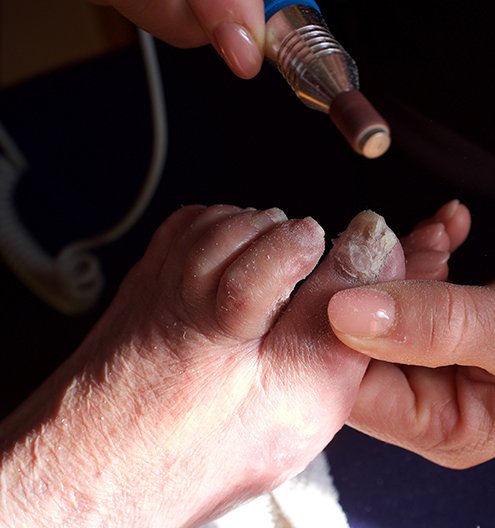THREE FACTS about the Cosmetic & Medical Nail Care Industry
As a licensed nail technician in Saline, Michigan, it has been a privilege to handle my clients' complex toenail cases for almost three decades now. Some clients are from nearby places. But modesty aside, some of them don't mind the 8-hour drive just so their feet can be handled by someone as gentle and meticulous as I am.
It's not that I'm the best in the world. It's just that clients can't find a nail tech in their hometown who can provide conservative nail care the way I show it on my YouTube videos.
It's either their local nail techs:
Are not confident in providing exceptional pedicure service
Don't want to handle complex toenail cases (ex: pincer nails, ingrown, nails with fungus)
They're afraid they might lose their license because people tell them that these cases are not within their scope
The people commenting on my Youtube channel and Tiktok are not helping because many of them say: "Why don't you just send them to a podiatrist?"
So… Let's set things straight right here, right now.
Fact #1: Two industries can provide nail care
The cosmetic industry (licensed nail techs)
The medical industry (podiatrists)
These two industries are not in competition. A combined effort between the two realms would serve the people with toenail problems best.
I don't know who put this narrative in motion that people with toenail issues have to see a doctor right away.
There is a time to send them to a podiatrist, and we (nail techs) know when that is. But the truth is, most people with toenail problems are not enthusiastic about toenail extraction and taking nauseating meds–-the most common option that doctors provide. This is where nail technicians can be helpful because…
Fact #2: Not all nail conditions are classified as MEDICAL cases.
More often than not, nail conditions are considered COSMETIC cases (which doctors don't do).
A lot of times, people get confused about where to get help, but what the general public doesn't realize is that podiatrists don't give pedicures. We nail techs, and podiatrists' actual crossover is trimming and filing nails. Podiatrists don't do the cleaning services that nail techs provide.
If the client wants to take the conservative/restorative route of nail care, we (nail techs) shall give it to them, provided that their case is still within our scope (example: no open wound, no bleeding, no warts, etc.)
Fact # 3: It is LEGAL for nail techs to work on nail fungus and pincer nails
just like it is legal to thin out thick toenails and clean around ingrown toenails to relieve the pain and pressure.
It is NOT TRUE that a nail tech could lose their license for telling a client their opinion, after being ASKED by the client, what they think about their nail situation.
*If you don't believe me, email your state board of cosmetology as I did. They told me that this would only become a legal issue if a client sued the nail tech, but that doesn't involve the state board.
Nail technicians are NOT ALLOWED to:
Diagnose and prescribe medicines,
Use a diagnosis code to bill insurance or prescribe for cosmetic issues
However, nail techs are ALLOWED to sell over-the-counter products to their clients like any other salon selling shampoo or skincare products.
The Beauty and Medical Industry Must Work Hand-in-hand.
Instead of shaming each industry's limitations, it's time to shift our focus to helping clients with toenail problems.
Several nail tech alumni have partnered with podiatrists, each working within their scope. If the client's toenail problem is beyond the scope of a nail tech (ex: has open wound, warts, needs anesthesia, etc.), the nail tech should gladly refer the client to the podiatrist. Similarly, when a podiatrist sees that the toenail problem may still qualify for conservative care, they can refer the patient to a highly-qualified nail technician. This is how we make our service client-centric.
A Message to Nail Technicians
Some nail techs are also guilty of shaming other nail techs, claiming that they're going to lose their license for tackling toenail fungus and selling OTC (over-the-counter) products. Think about this: Cosmetologists don't rant about hairstylists recommending dandruff shampoo for dry scalp, and hairstylists don't send someone with dandruff to a dermatologist. An esthetician is not badmouthed for doing facials and selling acne cleansers to clients instead of sending them to a dermatologist. In the same breath, nail technicians should not be shamed for recommending or selling OTC products to help restore clients' nails at home.
Other nail techs should also stop fear-mongering nail techs who can render conservative care to people with complex toenail problems. People with toenail problems get traumatized by careless nail techs' fast and painful pedicures. Don't be one of them. You are very much allowed to render conservative and restorative nail care to a relatively untapped demographic of people with cases like ingrown, pincer, and fungal nails. Of course, you just have to be knowledgeable and confident in doing specialized pedicures. This way, both clients and podiatrists will also be satisfied in sending referrals your way.
I can help you become the premium nail care provider you ought to be.
Be certified by the Global Meticulous Manicurist Academy so you can be a premium nail care provider. You can visit www.academy.themeticulousmanicurist.com to get all of the information you need to allow you to help more people in your community and create the financially rewarding career of your dreams.





